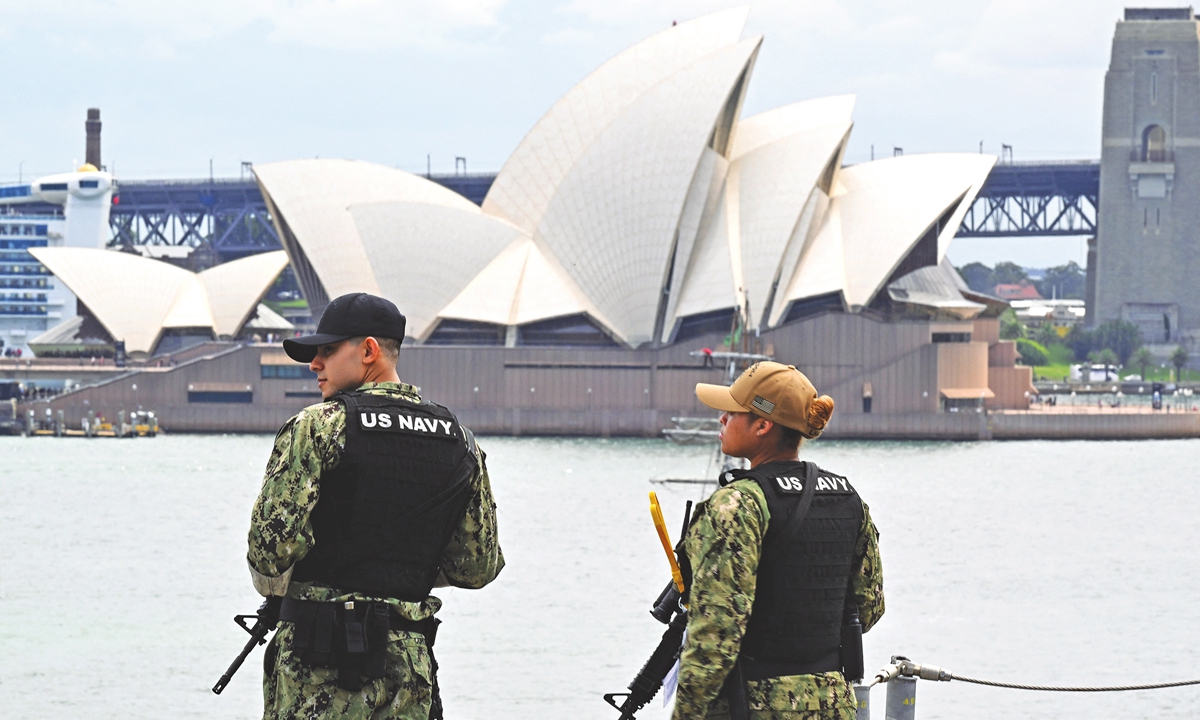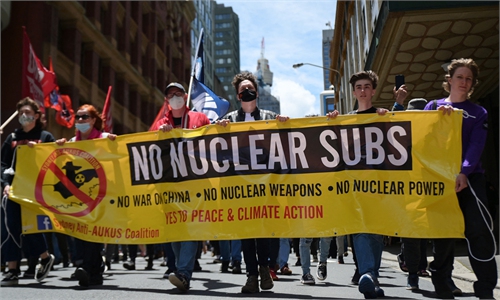
Australia's Opera House is seen past military personnel on board a US warship in Sydney on November 4, 2022. Photo: AFP
Editor's Note:
As the US recently expanded its military presence in Australia and promised to help Australia establish its missile manufacturing capacity, some argue that such a move is preparation for upgraded conflicts in Asia-Pacific. Has Australia become a military base of the US? How does the US influence Australia's strategy toward China and China-Australia relations? Are China-Australia relations and Australia-US relations zero-sum games? Dr. Digby James Wren (Wren), an Australian scholar and special senior advisor at the International Relations Institute, Royal Academy of Cambodia, shared his views with Global Times (GT) reporter Wang Zixuan in an interview.
GT: Recently, the US has been expanding its military presence in Australia and has promised to help Australia establish its missile manufacturing capacity. What do you think of this "help" from the US? Some have said that Australia will become a military base and arsenal of the US.
Wren: I think it's very clear that Australia is deeply embedded in the US' Indo-Pacific strategy, which is obviously designed to counter China. That's obviously where it's going. This is part of a greater plan of the US that's unfolding across the region, and that is to basically build military supply chains.
Now, Australia is being brought into this. It's part of the AUKUS arrangements. And it's a longstanding arrangement. I think this is only going to increase. And for the militarization of the Indo-Pacific, I don't see how that's really helpful, but that's where Australia is going. I suppose it's coming under a lot of criticism for doing this.
GT: There are analyses that the US moves in Australia are prepared for upgraded conflicts in the Asia-Pacific region, what's your understanding? Is it in Australia's interest to support the US by making itself a stronghold or providing arms to counter or even attack other countries?
Wren: The US is already basing B-52 bombers, and probably the most imminent part is the construction of a nuclear-capable submarine base on the east coast of Australia. So functionally, Australia is becoming a key base for a forward posture of US forces.
Australia doesn't have the capacity to maintain or even build any kind of nuclear-propelled sub. The Americans are basically using Australia to extend their nuclear submarine fleet bases. So they can operate out of Australia. Obviously, what we see here is nuclear proliferation. And the most ironic part is that the Australian government has an ambiguity about this in the sense that they say they don't know whether or not there's going to be nuclear weapons, which means that Washington is effectively controlling Australian military forces and projecting them into the Asia-Pacific region.
Every state has the right to defend itself and to have some kind of military capacity to guarantee its sovereignty and territorial integrity. But this is far more aggressive than that. This is about the projection of power, not Australian power, but US power. It's across the Pacific islands and into the South China Sea and possibly even onto the continental shelf between Taiwan and the mainland.
It's a very worrying increase in the capacity of the US. For Australia, I think it's a change in their posture from what was always defending the north of Australia to actually becoming an offensive arrangement targeted at China. The key issue is that it's militarization without any real dialogue, and it fits into a preconceived plan that doesn't take into consideration the actual realities of the Southeast Asian states and China, and even East Asia.

Digby James Wren Photo: Wren's Twitter account
GT: China-Australia relations have eased since the Albanese government, but some media have said that the deepening of US-Australia military cooperation is targeted at China. What impact do you think the US is having on Australia's strategy toward China and China-Australia relations?Wren: The Australia-China relationship has a long history since at least the 1970s, and that is very much based on trade. Australia's phenomenal economic performance over that period is largely due to this relationship.
So it's been a very good relationship that really has just been caught up in a larger strategy by the US. I think the Australian government, in many ways, has recognized this and allowed this to happen, and become a subject of the US. In fact, one could say that Australia's foreign policy is being set in Washington.
GT: In your eyes, are China-Australia relations and Australia-US relations zero-sum games?
Wren: It is often called the Cold War mentality or game theory. Yes, it tends to go in that direction. Obviously, they're not looking at a win-win strategy here. It's framed in the idea of deterrence. But the reality is that it's much closer to the idea that the US needs to impose. It's a military force over the area to guarantee a rules-based order where the rules are set in Washington and effectively disregard the voices of the ASEAN nations, China and others.
And that strategy in real terms is to limit the growth of China. I think that's very clear to everybody. So it's obviously a dangerous step for the militarized Asian arms race. It can't be helpful in the long term. Negotiations, diplomacy, cordial relations, mutual benefit, all of that stuff, and the continuing prosperity of the Australian economy is being discounted for very small advantages for US foreign policy.
It's destabilizing the region, and we already know that Europe has been destabilized enormously. There is no way that anybody wants further destabilization. Even the Australians don't want that, but they seem to be taking all the steps that would perhaps move closer to an actual conflict.
GT: What do you think about the coexistence of hostile voices toward China and rational calls for strengthening economic ties with China in your country? What do you think Australia should do to ensure its ties with China are in the interests of Australia?
Wren: I think that Australia's economy can't really live without China. Some might argue that China is also dependent in many ways on Australia's mineral exports. It's in neither party's interest to completely dismantle that arrangement. But the idea that Chinese money is being used from iron ore to build weapons that are going to be used against China is a very strange kind of zero-sum argument.
Australia has declining living standards. It relies heavily on trade and security with Southeast Asia. So Australia has no option but to maintain its trade relationship with China. The government has said from the outset that it would try to do that. But the Americans have basically offered them a deal where Australia pays a whole lot of money, and it gets this sort of defense upgrade.
I think China-Australia ties are going to maintain the current trajectory. It's going to be a very rocky road. I think there's very little opportunity for a sort of relaxation. So it's going to be very fraught. I fundamentally believe that Australia does not seek to have a war in Asia-Pacific. But I also believe that many Australian elites are completely skewed to the American view regardless of whether it's right or wrong, and I think that is probably the most dangerous part.
The only way that it might be corrected is through the democratic processes in Australia, and that is more important than this kind of potential war in the region. I really don't think these AUKUS arrangements are going to float. It's a kind of tactic without a strategy, and the Americans think that they've got their own deputy sheriff in Asia.
But in the long term, I think it's a miscalculation. China needs to retain its good neighbor relations. It needs to keep a very steady hand on its diplomacy and understand that. Now Australia is a very small country in real terms, and China has enormous interests in the region, maintaining a good relationship with Australia is also in China's best interest.
Since at least the 1970s, Australia has realized that its future is in Asia. While the Americans are often loaded as being the largest investors in Australia, actually, Australia is seeking investment for upgrading all the time. I think Australians, generally the political elites, understand that a conflict in the region is not to their benefit. They know that they need to have better relations with Southeast Asia, specifically with ASEAN.
But I think one of the key issues here is always the mentality. Do Australians really understand China? No. Do they really understand Southeast Asians and ASEAN and the answer? No, they don't. They think they do, but I'm based in Southeast Asia, and I spent a long time in China. And I think the view from there quite clearly points to the idea that the Australians are really still acting very much in a kind of colonial zero-sum. And the Americans are promoting that within Australia, they have enormous influence economically, politically, socially, and culturally. And they're using all of those things to manipulate the Australian population and its government.
At some point or another, I'd say in the next 3 to 5 years, the government is going to realize that growth in Asia is growth for Australia and that America and Europe are much less important for Australia's future.
I think that's a very worrying sign, and that's going to have to change in the future. I think it's obvious, especially in the business community. So maintaining open channels to China and Asia is very important. And that's a clear misunderstanding in the political circles in Canberra as well, the Americans, at the end of the day, don't really care too much about Australia.

